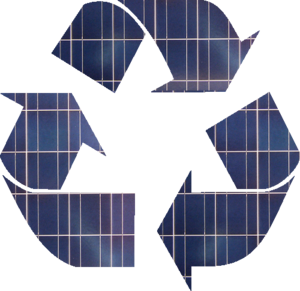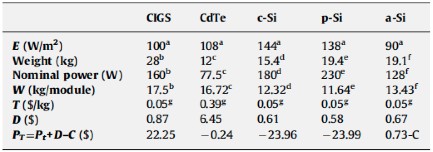
Rapid expansion of the solar photovoltaic (PV) industry is quickly causing solar to play a growing importance in the energy mix of the world. Over the full life cycle, although to a smaller degree than traditional energy sources, PV also creates solid waste. This paper examines the potential need for PV recycling policies by analyzing existing recycling protocols for the five major types of commercialized PV materials. The amount of recoverable semiconductor material and glass in a 1 m2 area solar module for the five types of cells is quantified both physically and the profit potential of recycling is determined. The cost of landfill disposal of the whole solar module, including the glass and semiconductor was also determined for each type of solar module. It was found that the economic motivation to recycle most PV modules is unfavorable without appropriate policies. Results are discussed on the need to regulate for appropriate energy and environmental policy in the PV manufacturing industry particularly for PV containing hazardous materials. The results demonstrate the need to encourage producer responsibility not only in the PV manufacturing sector but also in the entire energy industry.
Citation
McDonald, N.C., and J.M. Pearce. "Producer responsibility and recycling solar photovoltaic modules". Energy Policy 38(11) (2010): 7041-7047. QSpace pre-print open access
Major Findings[edit | edit source]
Cost of Recycling vs. Re-sale Cost
As can be seen in the table below, the cost of recycling three types of solar modules (CIGS, CdTe, x-Si) is compared to the profit made by re-selling the recovered semiconductor material and glass. In the case of CIGS, the profit of re-selling recovered materials greatly exceeds the cost of recycling the module. However, for CdTe and x-Si modules, the cost of recycling is higher than that of the profit of re-selling recovered material.
Cost of Recycling vs. Cost of Landfilling
It was determined that the cost of disposal for CIGS, c-Si, p-Si and a-Si were between $0.5 to $0.9 per module. However, because CdTe modules contain Cadmium, which is considered a hazardous material, the disposal cost of these modules was much higher, $6.45 per module. Additionally, the profitability of recycling the five types of solar modules was found, and except for CIGS modules, there was no profit that arose from recycling. Consequently, this makes landfilling a more attractive choice for disposal.
Motivation for Recycling
Because it was determined that there is little economic motivation to recycling solar modules, and given the toxicity of some materials in solar modules, it is suggested that policies be developed to ensure solar modules are recycled at the end of their life. One approach to developing these policies is to establish producer responsibility among PV manufacturers.
Related Research Pages
Recent update
- The EU Parliament has officially changed the guidelines for its WEEE (Waste Electrical and Electronic Equipment) Directive. Under the amendments, used PV modules must now be collected and recycled. Having found the commitment for the take back and recycling of PV modules by the solar industry too lax, the EU Parliament, on January 18, 2012, officially voted for the collection of 85% of all end-of-life PV modules in Europe. Meanwhile, 80% must be recycled.
- As of Sept 2012 all PV in Europe must be recycled. [1]
- Efficient recovery justifies silver's use in solar cells - Chemistry World
- 'Unlike the environmental failures seen in the geriatric fossil fuel industry, the photovoltaic industry is solving potential problems before they occur,' adds Joshua Pearce of Michigan Technological University in Houghton, US. 'With this kind of progress, the potential for a low-cost, solar-powered future looks pretty bright.'

